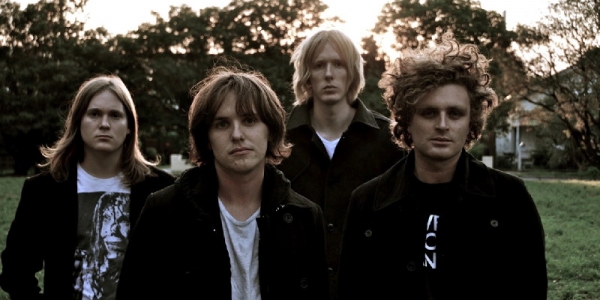“Ever since Guillotine, we’d been on the treadmill just doing stuff. We started at 17[-years-old] and just got spat out and all of a sudden we were 25[-years-old]. Everything fell by the wayside – education, careers, girlfriends. It was pretty much a drunken blur for that whole time.” The time after the Avalanche tour, when their label went into receivership was a tough time. “[The label] went down and we had nowhere to rehearse. We were going to call this album Another Christmas In The Trenches, but then we realised that we actually are living the dream. We leased a space in Preston, built our own studio and went with it,” Melia says.
British India signed to Liberation almost a year ago, claiming the switch from independent to label as mostly for the better. “We were so staunchly, vehemently independent so it was hard to get used to doing this with a label. We hated major labels, everything about them, the way they do business. But then we wanted change, we wanted to try something new,” he says.
“They had to be persistent. We were so hard to sign. They must have really, really wanted to sign us to put up with our bullshit for a few years. I’m surprised they stuck with it, to be honest,” he laughs.
Melia is upbeat about the signing though, citing change and having a “fresh perspective to give feedback” as one of the positive aspects of being on the label. “[Mushroom] have really grown, incorporating these cool independents like I OH YOU. We’ve had a bit of an identity shift, but it’s always been the five of us, so having extra people around giving their opinion is new.”
Melia described Controller as a “cathartic process,” explaining that it took a long time to make. “It’s hard to tell if people will like it. It’s not the album we meant it to be. It’s the biggest sin in music, but signing to the label really shaped the record. If we’d been on our own it’d be a different album altogether.”
However, they seem optimistic that it’s for the better, explaining that the label made them do things they wouldn’t have necessarily though of. “I Can Make You Love Me just wouldn’t have happened. We thought we couldn’t pull that kind of song off. It’s interesting, because it ‘s probably our least commercial single since I Said I’m Sorry.” They find the antithesis of the usual ‘sign to a label and make commercial records’ paradigm to be a welcome shift and were always optimistic about the album’s reception. “Every record we’ve made, when we make it, we think, ‘Fuck yeah, this is the best record ever, we’re going to be bigger than The Smiths,’ then the cocaine wears off,” he laughs. “Then the record comes out, and we’re not [big]. We’ve had our hearts broken so many times. This one (Controller) deserves to be big, though. No Australian band has made a record like this since we were growing up,” Melia says.
There is a sense of anticipation among the band members concerning how the album will be received. “Last time, we ended up being a Nova band towards the Avalanche tour. Nova listeners just don’t go to shows though,” Melia says.
Melia is adamant that triple j are responsible for a lot of their success. “We owe them everything. When I say we’re a triple j band, that’s what I mean. We love triple j. For all they get criticised, they’re an island of credibility in the Australian scene. The Nova people go to maybe a Foo Fighters show or a festival, they don’t see us. The triple j kids buy tickets and made us what we are.”
The album itself is a much more mature, grown-up British India. I Can Make You Love Me is an interesting choice for first single, but overall, British India are back, and they sound like they know what they’re doing. By their own admission, “we’re old farts now.”
After it all and on the eve of their tour, British India are grateful, humble and honest about their achievements. Matt O’Gorman asserts, “the best thing about being in this band – we’re all just friends, faffing around, hanging out, living the dream. We’ve been really lucky and we know it.”
BY REI BARKER







